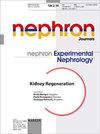{"title":"AMP-活化蛋白激酶激动剂在肾缺血再灌注中的益处:自噬和细胞应激标志物。","authors":"Anne-Emilie Declèves, Kumar Sharma, Joseph Satriano","doi":"10.1159/000368932","DOIUrl":null,"url":null,"abstract":"<p><p>Background: Kidney ischemia-reperfusion is a form of acute kidney injury resulting in a cascade of cellular events prompting rapid cellular damage and suppression of kidney function. A cellular response to ischemic stress is the activation of AMP-activated protein kinase (AMPK), where AMPK induces a number of homeostatic and renoprotective mechanisms, including autophagy. However, whether autophagy is beneficial or detrimental in ischemia-reperfusion remains controversial. We investigated the effects of agonist induction of AMPK activity on autophagy and cell stress proteins in the model of kidney ischemia-reperfusion. Methods: AMPK agonists, AICAR (0.1 g/kg) and metformin (0.3 g/kg), were administered 24 h prior to ischemia, with kidneys harvested at 24 h of reperfusion. Results: We observed a paradoxical decrease in AMPK activity accompanied by increases in mammalian target of rapamycin (mTOR) C1 activity and p62/SQSTM1 expression. These results led us to propose that AMPK and autophagy are insufficient to properly counter the cellular insults in ischemia-reperfusion. Agonist induction of AMPK activity with AICAR or metformin increased macroautophagy protein LC3 and normalized p62/SQSTM1 expression and mTOR activity. Ischemia-reperfusion increases in Beclin-1 and PINK1 expressions, consistent with increased mitophagy, were also mitigated with AMPK agonists. Stress-responsive and apoptotic marker expressions increase in ischemia-reperfusion and are significantly attenuated with agonist administration, as are early indicators of fibrosis. Conclusions: Our data suggest that levels of renoprotective AMPK activity and canonical autophagy are insufficient to maintain cellular homeostasis, contributing to the progression of ischemia-reperfusion injury. We further demonstrate that induction of AMPK activity can provide beneficial cellular effects in containing injury in ischemia-reperfusion. © 2014 S. Karger AG, Basel.</p>","PeriodicalId":18993,"journal":{"name":"Nephron Experimental Nephrology","volume":" ","pages":"None"},"PeriodicalIF":0.0000,"publicationDate":"2014-12-06","publicationTypes":"Journal Article","fieldsOfStudy":null,"isOpenAccess":false,"openAccessPdf":"https://www.ncbi.nlm.nih.gov/pmc/articles/PMC4458239/pdf/nihms637786.pdf","citationCount":"0","resultStr":"{\"title\":\"Beneficial Effects of AMP-Activated Protein Kinase Agonists in Kidney Ischemia-Reperfusion: Autophagy and Cellular Stress Markers.\",\"authors\":\"Anne-Emilie Declèves, Kumar Sharma, Joseph Satriano\",\"doi\":\"10.1159/000368932\",\"DOIUrl\":null,\"url\":null,\"abstract\":\"<p><p>Background: Kidney ischemia-reperfusion is a form of acute kidney injury resulting in a cascade of cellular events prompting rapid cellular damage and suppression of kidney function. A cellular response to ischemic stress is the activation of AMP-activated protein kinase (AMPK), where AMPK induces a number of homeostatic and renoprotective mechanisms, including autophagy. However, whether autophagy is beneficial or detrimental in ischemia-reperfusion remains controversial. We investigated the effects of agonist induction of AMPK activity on autophagy and cell stress proteins in the model of kidney ischemia-reperfusion. Methods: AMPK agonists, AICAR (0.1 g/kg) and metformin (0.3 g/kg), were administered 24 h prior to ischemia, with kidneys harvested at 24 h of reperfusion. Results: We observed a paradoxical decrease in AMPK activity accompanied by increases in mammalian target of rapamycin (mTOR) C1 activity and p62/SQSTM1 expression. These results led us to propose that AMPK and autophagy are insufficient to properly counter the cellular insults in ischemia-reperfusion. Agonist induction of AMPK activity with AICAR or metformin increased macroautophagy protein LC3 and normalized p62/SQSTM1 expression and mTOR activity. Ischemia-reperfusion increases in Beclin-1 and PINK1 expressions, consistent with increased mitophagy, were also mitigated with AMPK agonists. Stress-responsive and apoptotic marker expressions increase in ischemia-reperfusion and are significantly attenuated with agonist administration, as are early indicators of fibrosis. Conclusions: Our data suggest that levels of renoprotective AMPK activity and canonical autophagy are insufficient to maintain cellular homeostasis, contributing to the progression of ischemia-reperfusion injury. We further demonstrate that induction of AMPK activity can provide beneficial cellular effects in containing injury in ischemia-reperfusion. © 2014 S. Karger AG, Basel.</p>\",\"PeriodicalId\":18993,\"journal\":{\"name\":\"Nephron Experimental Nephrology\",\"volume\":\" \",\"pages\":\"None\"},\"PeriodicalIF\":0.0000,\"publicationDate\":\"2014-12-06\",\"publicationTypes\":\"Journal Article\",\"fieldsOfStudy\":null,\"isOpenAccess\":false,\"openAccessPdf\":\"https://www.ncbi.nlm.nih.gov/pmc/articles/PMC4458239/pdf/nihms637786.pdf\",\"citationCount\":\"0\",\"resultStr\":null,\"platform\":\"Semanticscholar\",\"paperid\":null,\"PeriodicalName\":\"Nephron Experimental Nephrology\",\"FirstCategoryId\":\"1085\",\"ListUrlMain\":\"https://doi.org/10.1159/000368932\",\"RegionNum\":0,\"RegionCategory\":null,\"ArticlePicture\":[],\"TitleCN\":null,\"AbstractTextCN\":null,\"PMCID\":null,\"EPubDate\":\"\",\"PubModel\":\"\",\"JCR\":\"\",\"JCRName\":\"\",\"Score\":null,\"Total\":0}","platform":"Semanticscholar","paperid":null,"PeriodicalName":"Nephron Experimental Nephrology","FirstCategoryId":"1085","ListUrlMain":"https://doi.org/10.1159/000368932","RegionNum":0,"RegionCategory":null,"ArticlePicture":[],"TitleCN":null,"AbstractTextCN":null,"PMCID":null,"EPubDate":"","PubModel":"","JCR":"","JCRName":"","Score":null,"Total":0}
引用次数: 0



 求助内容:
求助内容: 应助结果提醒方式:
应助结果提醒方式:


